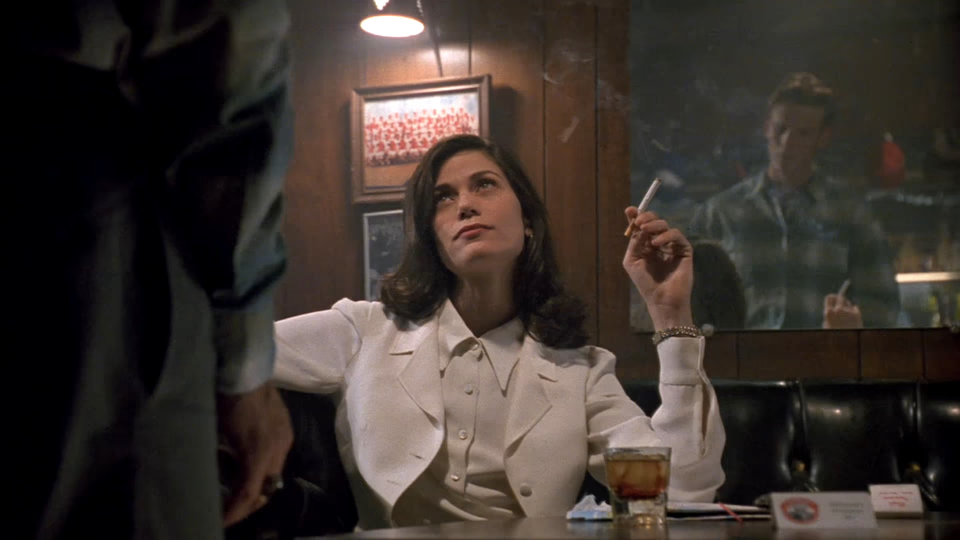The Last Seduction

Linda Fiorentino plays Bridgette, the floor manager of a high-pressure cold-call sales racket in New York City who runs out on her husband with the spoils of a drug deal he’s just completed. She hides out in a small upstate New York town where she meets Mike, played by Peter Berg. Mike is a claims adjuster convinced he’s too big for the small town. He finds Bridgette irresistible. She finds him convenient. With her husband closing in, Bridgette hatches a plan for her and Mike to start a new life together. He just has to commit a murder. Spoilers follow.
The Last Seduction is equal parts brilliant and frustrating. For much of its running time, it delivers a heightened satire of the film noir genre.
Fiorentino shines as Bridgette, a noir femme fatale cranked to eleven. When Mike approaches her at the town’s lone bar, she dismisses him, saying, “Go find yourself a nice little cowgirl and make nice little cow babies and leave me alone.”
“I’m hung like a horse,” he whispers. “Think about it.”
“Let’s see,” she replies and unzips his fly, and fishes around in his pants to verify his claim. Satisfied, she invites herself back to his place. The next morning, she’s rummaging around his fridge for something to eat while on the phone with her lawyer. She settles on a pie, tries a bite, and spits it back into the dish. After hanging up, she stubs out her cigarette on the pie, and we spy the note on top, “Love, Grandma.” That’s cold, Bridgette.
Later that morning, she’s downtown to grab coffee and a paper. A dozen people pass her on the street, each saying, “Good morning!” She replies with stone silence.
As her hapless husband, Bill Pullman’s performance seems plucked from a farcical comedy. In the opening drug deal, he falls to his knees, closes his eyes, and whimpers, convinced the buyers have double-crossed him when they’re just reluctant to part with their nice suitcase. Later, he’s running in place to feign being winded when making a phone call, and even later he’s hopping around his apartment, handcuffed and gagged, pointing out clues to a would-be executioner.
These sorts of characters would seem at home in a Coen brothers picture. Indeed, watching The Last Seduction gave me a better appreciation for the tonal mastery the Coens display in their genre parodies. A deft touch this film lacks.
From the outset, the film’s light jazz score contrasts the story’s significant narrative stakes. This dichotomy hints we’re in for a heightened experience and that the film isn’t taking itself too seriously. Combined with the aforementioned dialogue, and you’ve got a satirical twist on Double Indemnity unshackled by the Hays code. But the film also features two murders and a problematic third-act reveal.
Mixing comedy and murder isn’t new. The Coens may be the modern masters. But these murders seem plucked from a straight noir and lack any sense of irony or heightened execution.
But I can look past the murders. The third act reveal, however, proves a bridge too far. Bridgette manipulates Mike into committing the murder by faking a letter from his ex-wife, saying she’s moving to town to be near him but that “Nobody needs to know our secret.”
The secret in question is that she’s transgender. When Mike threatens to go to the police, Bridgette goads him into assaulting her by saying, “You married a man, you farm f****t.” This assault frames Mike for the murder she committed and lets her walk free.
I see two ways to interpret this twist. Either the filmmakers again misplayed the film’s tone and went for straight noir instead of heightened parody, or—even worse—they felt transphobia was heightened parody.
Did the film intend this as a takedown of small-town morals? Given an earlier scene involving a black detective asking about Bridgette and the all-white town askance about his blackness, perhaps. But that scene had us laughing at the townsfolk. This scene just feels mean-spirited. Tone is tricky, and misjudging it here sours an otherwise entertaining ride.
That said, at least the film nailed the ending. Seeing Bridgette walk away free and rich keeps the film from being a total disappointment.